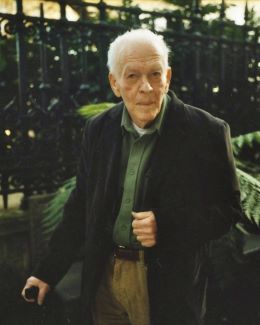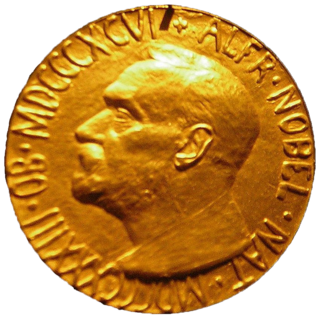
The Nobel Prizes are five separate prizes that, according to Alfred Nobel's will of 1895, are awarded to "those who, during the preceding year, have conferred the greatest benefit to humankind." Alfred Nobel was a Swedish chemist, engineer, and industrialist most famously known for the invention of dynamite. He died in 1896. In his will, he bequeathed all of his "remaining realisable assets" to be used to establish five prizes which became known as "Nobel Prizes". Nobel Prizes were first awarded in 1901.

Clyde Jackson Browne is an American rock musician, singer, songwriter and political activist who has sold over 18 million albums in the United States.

Elizabeth Williams was a peace activist from Northern Ireland. She was a co-recipient with Mairead Corrigan of the Nobel Peace Prize in 1976 for her work as a cofounder of Community of Peace People, an organisation dedicated to promoting a peaceful resolution to the Troubles in Northern Ireland.

Mairead Maguire, also known as Mairead Corrigan Maguire and formerly as Mairéad Corrigan, is a peace activist from Northern Ireland. She co-founded, with Betty Williams and Ciaran McKeown, the Women for Peace, which later became the Community for Peace People, an organization dedicated to encouraging a peaceful resolution of the Troubles in Northern Ireland. Maguire and Williams were awarded the 1976 Nobel Peace Prize.

Gene Sharp was an American political scientist. He was the founder of the Albert Einstein Institution, a non-profit organization dedicated to advancing the study of nonviolent action, and professor of political science at the University of Massachusetts Dartmouth. He was known for his extensive writings on nonviolent struggle, which have influenced numerous anti-government resistance movements around the world.

Daniel Joseph Berrigan was an American Jesuit priest, anti-war activist, Christian pacifist, playwright, poet, and author.
Promoting Enduring Peace is an American peace advocacy organization based in Connecticut. It is sometimes referred to as PeaceNews.org, the name of its website.

John Dear is an American Catholic priest, peace activist, lecturer, and author of 35 books on peace and nonviolence. He has spoken on peace around the world, organized hundreds of demonstrations against war, injustice and nuclear weapons and been arrested 85 times in acts of nonviolent civil disobedience against war, injustice, poverty, nuclear weapons and environmental destruction.
The Indira Gandhi Prize, or the Indira Gandhi Peace Prize, also known as Indira Gandhi Prize for Peace, Disarmament and Development, is the prestigious award accorded annually by Indira Gandhi Memorial Trust to individuals or organisations in recognition of creative efforts toward promoting international peace, development and a new international economic order; ensuring that scientific discoveries are used for the larger good of humanity, and enlarging the scope of freedom. The prize carries a cash award of 2.5 million Indian rupees and a citation. A written work, in order to be eligible for consideration, should have been published. The panel constituted by the Indira Gandhi Memorial Trust consists of prominent national and international personalities including previous recipients. The recipients are chosen from a pool of national and international nominees.

Kathy Kelly is an American peace activist, pacifist and author, one of the founding members of Voices in the Wilderness, and, until the campaign closed in 2020, a co-coordinator of Voices for Creative Nonviolence. As part of peace team work in several countries, she has traveled to Iraq twenty-six times, notably remaining in combat zones during the early days of both US–Iraq wars.
The Gandhi Foundation is a United Kingdom-based voluntary organisation which seeks to further the work of Mahatma Gandhi through a variety of educational events and activities.

Arik Ascherman is an American-born Israeli Reform rabbi, and Executive Director of the Israeli human rights organization Torat Tzedek-Torah of Justice. For 21 years, starting in 1995, he served as Co-Director (1995-1998), Executive Director (1998-2010), Director of Special Projects (2010-2012) and President and Senior Rabbi (2012-2017) for Rabbis for Human Rights, an Israeli organization.
Michael N. Nagler is an American academic, nonviolence educator, mentor, meditator, and peace activist.

The Nobel Peace Prize is one of the five Nobel Prizes established by the will of Swedish industrialist, inventor and armaments manufacturer Alfred Nobel, along with the prizes in Chemistry, Physics, Physiology or Medicine and Literature. Since March 1901, it has been awarded annually to those who have "done the most or the best work for fraternity between nations, for the abolition or reduction of standing armies and for the holding and promotion of peace congresses". The Oxford Dictionary of Contemporary History describes it as "the most prestigious prize in the world".

Omar Barghouti is a founding committee member of the Palestinian Campaign for the Academic and Cultural Boycott of Israel (PACBI) and a co-founder of the Boycott, Divestment and Sanctions (BDS) movement. He received the Gandhi Peace Award in 2017.
The Sunhak Peace Prize is an award. It was established to continue the legacy of Sun Myung Moon, founder of the Unification Church, and is given biennially in Seoul, Korea, in recognition of individuals and organizations that have made enduring contributions to help resolve worldwide suffering, conflict, poverty, and threats to the environment.











